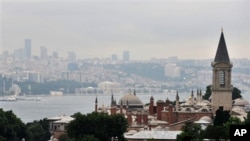Hard economic times in Europe is hitting the tourist industry in Turkey. But the country is enjoying a rather surprising dividend in the growing popularity of its prime Minister Recep Tayyip Erdogan across the Middle East. It is proving an increasingly popular destination for Arab tourists.
When he arrived in Cairo last month, the Turkish Prime Minister Recep Tayyip Erdogan received the sort of welcome usually reserved for rockstars.
Thousands of cheering Egyptians turned out to see Mr. Erdogan who has strongly supported the Arab Spring uprising and waged a diplomatic war against Israel.
And, as a result of his popularity in Middle Eastern countries, Arab tourists are now choosing to visit Turkey.
Here in Istanbul on the city's main street, Istiklal cad, throngs of Arab tourists are now a common sight. Its predicted nearly 2 million Arab tourists will visit Turkey this year, nearly double last year's number.
For many, like Ahmet from Kuwait, the almost cult status of Mr. Erdogan was a reason why he chose to spend his vacation in Istanbul.
"Erdogan , nice guy," said Ahmet. "You know there is a relation between all Muslims. Because I heard about Erdogan I came here, nice country. Before I go U.K. and U.S., Malaysia."
Shops are adapting fast to this new trend. In this shopping mall, signs in Arabic have appeared everywhere next to the customary English one.
And that's not surprising. Arab tourists, many of whom are from oil rich countries, have a reputation for having much deeper pockets than many of their cash-strapped European counterparts.
That means a major boost to the economy, according chief economist Emre Yigit from the financial trading house Global Securities.
"If you go out on the streets in Istanbul, one can very safely say one has never seen as many Arab tourists in Turkey, and we know that overall number of tourists is also increasing rapidly in 2011," said Yigit. "So it looks like its going to be a bumper year for tourism. And there is circumstantial evidence that the Arab tourists are relatively good spenders as well. So they are supporting the economy it appears."
Turkey is cashing in on its growing prestige, aggressively targeting Middle Eastern tourists.
And, Arab tourism is more than a welcome boost for many of Istanbul's hotels.
At the CVK hotel in central Istanbul, Manager Edip Celick says Arab tourists are now the main source of customers.
"European Union for crisis, no came from Greece no came from Spanish,
Celick. "But all hotel 60 or 70 percent Arabic people stay in hotel. And the for Arabic people like the shopping mall and their first question [is] 'Where is the shopping mall?'"
But its not only shopping and Turkey's growing regional prestige that attracts tourists. It's also Turkish television soaps that air in several Arab countries.
The highly produced programs, many with their comparatively risque story lines, by conservative Arab standards, are proving so popular that many Arabs come to visit the film locations.
Aydar Sengec is guiding around the latest group of Arab tourists to visit one of Istanbul's mansions on the shoreline of the Bosphorus waterway. The building features in one of the biggest Turkish TV hits in the Middle East. Sengec says they are overwhelmed by the interest shown by Arabs.
"The visitors come from Saudi Arabia," said Sengec. "All these people come from the Middle East also north Africa, from Algeria, Tunisia and Morocco. There are 3,000 people who came in two months. Especially woman. They like the characters. They like the story. Because the story is familiar, the same family relations."
One of those visiting is Kuwaiti Asla. She says they just can't get enough of Turkish soaps and the lifestyle they portray.
"We all love the actors the artists," said Asla. "The Arab love too much this drama. You see the streets , nobody, no cars, all the house, all see the TV."
Analysts are predicting difficult economic times for Europe for some time to come. But Istanbul and the rest of the country are now hoping there will be further opportunities to exploit the deep pool of goodwill that observers say exist towards Turkey across the Arab world.
Turkey Taps Arab World For Tourist Dollars
- By Dorian Jones




